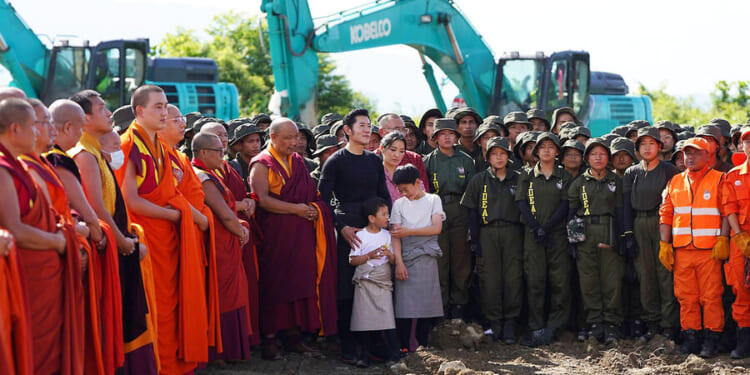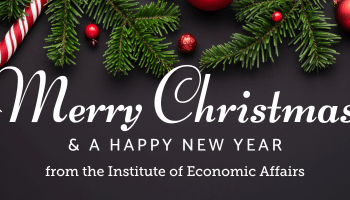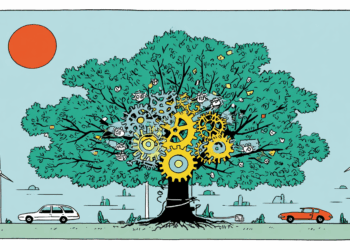Driving into Gelephu, the breathtaking Himalayan vistas that Bhutan is known for gradually give way to mundane patches of farmland peppered with the occasional cement house with traditional Bhutanese wood carvings. Yet, in the years to come, this little-known corner of Bhutan might well determine the country’s future.
Here, along its southern border with India, Bhutan is building Gelephu Mindfulness City (GMC), a sprawling metropolis expected to be roughly twice the size of Los Angeles. It’s an ambitious, $100 billion endeavor to turbocharge Bhutan’s economy while upholding the values of holistic well-being and sustainable development that the country holds dear.
For decades, the tiny Buddhist kingdom has relied on a Gross National Happiness (GNH) index to guide its development, rather than focusing on the size of its economy. This approach has earned Bhutan global recognition, but it has not translated into enough jobs. Young Bhutanese are moving abroad in large numbers to seek better opportunities.
Why We Wrote This
Bhutan has long relied on a Gross National Happiness index to guide its development, but that is not creating enough jobs. Can the tiny Himalayan kingdom hang on to its non-materialist Buddhist values and boost economic growth at the same time?
To bring them back, Bhutan’s leaders have envisioned a new economic hub to provide what they call “mindful prosperity.”
It’s a subtle acknowledgment that the path to happiness, in the modern world, cannot bypass material wealth – but neither does it have to be all about money.
Bhutanese are known for eschewing materialism, and for “how much value we give to social harmony and well-being,” says Lotay Tshering, the governor of GMC and Bhutan’s former prime minister. But a common misconception, he says, is that Bhutanese are happy to be poor. “We also want to be rich, but how?”
To find out, the country is experimenting with something akin to “mindful capitalism,” an increasingly popular business philosophy in the United States.
The phrase can seem paradoxical. “It’s a term that, frankly, has been co-opted in the West by corporations looking to give their extractive practices a softer glow,” says Ronald Purser, a professor at San Francisco State University and author of “McMindfulness: How Mindfulness Became the New Capitalist Spirituality.” In Silicon Valley, he says, mindful capitalism is mostly a branding gimmick, but Bhutan could be different.
“If anyone’s going to pull it off,” he says, “it’s probably them.”
Bhutan’s approach to happiness
Every five years, survey-takers travel across the Himalayan kingdom to gauge how people are doing physically, spiritually, and emotionally. They ask hundreds of questions to compute the Gross National Happiness index, which many economists and social scientists argue is better than gross domestic product at measuring a nation’s progress.
“In a world that’s hooked on GDP … here’s a country saying, ‘Hold on a second – what’s the point of all this growth if people aren’t actually thriving?’” says Professor Purser.
Bhutan’s unique approach has resonated around the world, sparking enormous interest in happiness and well-being studies. Its own GNH index improved between 2015 and 2022, when it was last measured, but youth unemployment over that same period grew significantly, fueling record levels of emigration. Roughly 1 in 10 Bhutanese now live abroad.
That doesn’t mean GNH has failed, says Micael Dahlén, chair of the Center for Wellbeing, Welfare and Happiness at the Stockholm School of Economics. Just that there needs to be a balance between happiness and economic growth.
“Too much focus on one of the two can be detrimental to the other,” he says. “We cannot separate them.”
Many Bhutanese see the Gelephu project as an extension of Bhutan’s happiness philosophy, but they also recognize that their country is at a crossroads.
Long considered one of the most isolated countries on Earth, Bhutan has slowly begun to open up to the outside world. Smartphones, internet cafes, and cryptocurrency are transforming life in the tiny kingdom, which only legalized television and the internet in 1999.
In recent years, the government has eased up on famously strict tourism regulations to bring in more foreign dollars. And this past January, young people flocked to see British singer Ed Sheeran perform at the country’s first-ever major international concert.
“For a very long time, I think we have been very happy with whatever we have, very content with our smallness,” says Kinley Tshering, a Bhutanese filmmaker and journalist, with no relation to the GMC governor. “Now, we are thrown into this 21st century and we realize, maybe not all our people want the same thing, especially the younger generation. Their dreams are different.”
Building a “mindfulness city”
A city that epitomizes mindfulness will need to go beyond yoga studios and meditation domes, says Professor Purser. “I’d want to see a city where the very design invites reflection. Where economic activity doesn’t come at the cost of ecological degradation,” he says.
Gelephu appears to be aiming for something like that, though the details can get fuzzy.
“Try to imagine a city that wouldn’t displace the nature or the agriculture around it, but rather enhance it and integrate it,” says Danish architect Bjarke Ingels, whose firm is designing GMC. Bridges across the area’s many rivers will double as community spaces — such as a spirituality center or a market for local produce — and a large dam will house a Buddhist temple, he says.
The city will be full of public spaces that offer people a chance to reflect, but mindfulness in Gelephu will go beyond meditation, adds Dr. Tshering, the governor. He says it should prompt residents and visitors to “be mindful about your environment, mindful about the socio-economic status of the whole area, and mindful about [something] as simple as what comes on your dining table.”
That means all vehicles will be electric, all food will be organic, and all the power will come from renewable energy. Dr. Tshering says the plan is to carefully measure the carbon footprint of each building as it’s constructed, and to ultimately make GMC carbon-negative, like the rest of Bhutan.
Companies that want to invest will be screened for their environmental and cultural impacts, and only those whose values align with mindfulness principles will be invited.
Overseeing all this directly will be Bhutan’s king, Jigme Khaesar Namgyal Wangchuck. Bhutanese people have deep faith in the monarchy and strongly believe that this top-down control will help ensure that GMC doesn’t stray from its goals or turn into a capitalist nightmare.
Bhutan’s long-standing commitment to happiness and its track record on environmental protection make Professor Purser cautiously optimistic about GMC. But uncertainty persists: Will GMC become a haven for the elite, or will it truly serve the Bhutanese?
It will be a long time until the world finds out. This summer, crews broke ground on Gelephu’s first major construction project – an international airport. Just building the new city’s essential infrastructure is expected to take another 10 years.














